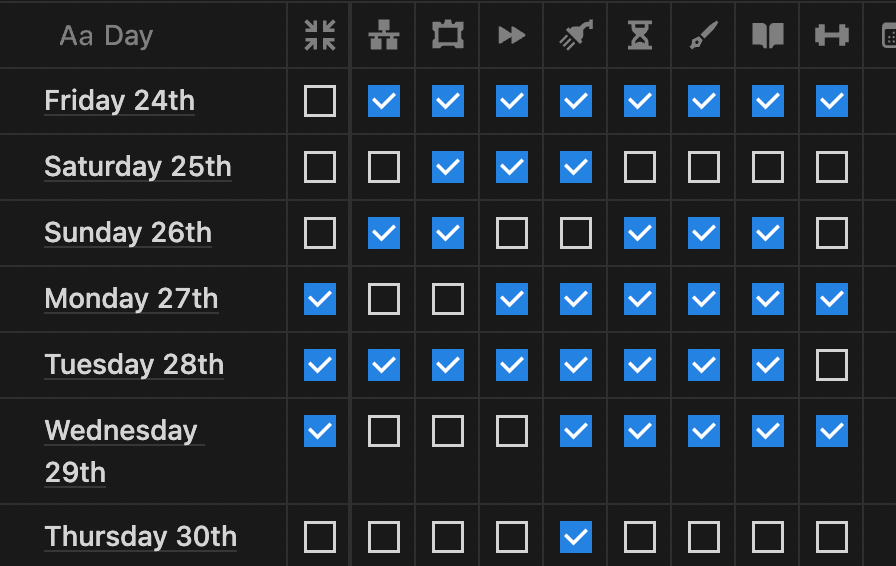Unlock Your New Identity With Stoicism – Patterns Of Thought

Things look like chaos, until you recognise there’s a pattern to things. If you can recognise patterns. You can change your life
Tony Robbins
If we define our identity, it is simply a collection of thoughts we feel comfortable associating with. These familiarities or associations with thoughts have been taught to us by parents, institutions, or experiences, nudging us in different directions.
Therefore, a negative identity is just a negative reaction and affiliation, so it is not inherently unchangeable. I learned the most potent way to evolve your identity when watching Tony Robbins’ conversation with Theo Von about Patterns of Thought.
This article admires Tony Robbins’ idea of Patterns of Thought and magnifies it under a Stoic lens. This is a roadmap for identifying a healthier identity, embracing it, and dealing with inevitable setbacks of change. Identity is the foundation of filtering and acting on thoughts, so we should start at the beginning of which thoughts we identify with most. Focus on our identity, and the downstream effects will speak for themselves.
1. Why The Stoics Understood Patterns of Thought
The things you think about determine the quality of your mind.
Marcus Aurelius
If we see ourselves as a lazy identity, what would we say justifies this? Is it because we don’t leave bed till midday, don’t have the energy to work out, or don’t bother working hard because we don’t have the motivation? These could justify our identity, but we could easily fall into a downward spiral, cyclically reinforcing both the behaviour and weight of these labels.
Ironically, even if we have all the justification for a lazy or depressed identity, this does not determine our identity for the rest of our lives. The stoics knew the effects of our thoughts were determined, but the thoughts we chose to affect were within our control. We cannot unravel a negative identity overnight, but we have the power to give new patterns of thought greater attention.
Perhaps contrarian, I believe identity is malleable and within our control. Like building any habit, we can unlearn unhelpful habits of thought and train new ones. These new thought patterns will incrementally become easier to act on over time, like any habit. Eventually, these patterns will become second nature, and your identity will no longer be ‘new’, but who you are. We do not have control over which thoughts appear in our minds, but we do choose which ones we engage with, therefore we can slowly alter our collection of thoughts to embrace a stronger, healthier identity.
2. Identify New Patterns Of Thought
Your soul takes on the colour of your thoughts.
Marcus Aurelius
Here is an actionable step. Grab a piece of paper and a pen, and write down all the limiting beliefs you have of yourself now. Why aren’t you happy? Is it you were picked on in school? Is it because you don’t feel you deserve happiness? The more you put on this paper, the better.
Now… write about if you were happy, what would your belief system be made out of. I was picked on in school, but I accept this fact and let go of its relevance to my confidence today. I deserve happiness not because I have something more than others but because I try and better myself every day.
What is the difference between these two mentalities? The latter accepts flaws and lets them go because they only hold weight if we let them. These are simply two different habits of thinking under the same circumstances. Like within James Clear’s Atomic Habits, habits are a double-edged sword, but all can be learned and unlearned.
Tony Robbins used this analogy to explain how we shape our reality to what we look for. If I told you to look for everything red in your room, you would find everything red. Now, if I told you to close your eyes and tell me everything blue, you would struggle to remember everything there. Exactly like the viral video of the gorilla dancing amongst students passing the ball to each other, and we did not notice because we were too busy counting the passes. Think of our perception of reality the same way. We interpret reality based on the conditions we internally set on it.
Like our identity, we will only find the negative if we only look for the negative. If we look for the positives, we will shape our minds to only look for that. Therefore, the steps to take are finding your new perspective and acting on it long enough to become your habit and belief system. It is not that one is right or wrong, but if one brings you happiness, shouldn’t this be the one we should work towards?
3. Build Your New Identity
Let a man radically alter his thoughts, and he will be astonished at the rapid transformation it will effect in the material conditions of his life.
James Allen
Robbins also used the analogy of ‘Emotional Homes’. These are similar to thoughts but emotions that we are comfortable and familiar with. Our identity will take on the shape of the emotions we are most comfortable with. However, familiarity alone should never justify continuing them, especially if they harm us.
I wrestled with this concept myself when unlearning my conditional worth. In November 2023, I felt I only deserved happiness if I met impossible productivity thresholds. I had a habit tracker comprised of 9 difficult tasks to complete daily. Of course, I never hit all 9, meaning I felt I was not worthy of happiness and fulfilment:

(Left to right: Analyse a negative thought, job applications, blog writing, intermittent fasting, cold shower, meditating, journaling, reading and exercising alongside a full-time job)
I wanted to adopt a new way of thought. Any accomplishment should be a bonus, not a threshold to my contentedness. When I tried to embrace this, however, I felt alienated. I reverted to previous beliefs because those feelings were familiar and comfortable in the short term… This paradox is the knowing you have negative, unhelpful beliefs, but your comfort zone lies within these, so positivity feels foreign and untrustworthy.
I admire Tony Robbins for his concept of Patterns of Thought and for practising new ones. If you experiment by acting with a positive belief system for a short period of time, you will notice pretty quickly how unhelpful your previous beliefs were and how this new pattern could be your ‘emotional home’.
Experiment even for a day and allow yourself to explore a new pattern of thought. You have nothing to lose in trying this, so why not? It is like faking it till you make it and realising along the way how simple it was to improve your outlook. If you experiment with positive self-belief, after the initial unfamiliarity wears off, you will notice it was within you, not external circumstances, that decide whether you were happier or not.
4. Incrementally Embed Your Identity Everyday
Well-being is realised by small steps, but is truly no small thing.
Zeno
It sounds arrogant to say change your identity, but the hardest truth is that most things are actually very simple, just not very easy. When you unravel the knots of old beliefs, you must do this incrementally; otherwise, they will tighten again. The stoics did not trouble themselves with their past or future and kept their focus exactly on the present, assembling their identities action by action.
You do not need to look six months ahead and expect to wake up tomorrow with a present, accepting, and grateful mindset. James Clear used the simple analogy of getting better by 1% daily. This may not seem like much tomorrow morning if you were only 1% improved, but scale this over a year, and every year, you become 365% better. Now, it appears much more potent if we broaden our perspective.
Focus on the present moment but expand your field of view to the bigger picture. Doing the hard thing, like acting away from a negative thought you previously identified with, will be uncomfortable and cumbersome. However, the version of you in 10 years will definitely appreciate the decisions you make now.
5. Dealing With Setbacks
Show me! By God, how much I’d like to see a Stoic. But since you can’t show me someone that perfectly formed, at least show me someone actively forming themselves so.
Epictetus
Premeditatio Malorum is a Stoic mantra meaning the ‘premeditation of evils’. Setbacks are an inevitable part of life and will be especially apparent when embracing healthier beliefs about ourselves. When we realise failure is inevitable, we can prepare. When we prepare, these setbacks are neither surprising nor effective at steering us away from the right direction.
I am working on unlearning an overthinker’s identity and embracing a calm and present one. I have learned ruminating on your thoughts of becoming better or happier can actually hinder more than help me. Instead of analysing why or how I need to improve my identity, I focused on allowing thoughts to disappear without the urge to rationalise them.
Seeing the immense benefits already has not made my life absent of overwhelm and grief, but I am definitely happier on this path. We can even incorporate our reaction to setbacks within our identity. We accept these will happen, but it will not change how we act or our patience with ourselves.
Patience is a virtue, especially with ourselves. Identities are just familiar patterns of thought, and if these have been embedded over many years, have compassion to humanise yourself if it takes time to undo. One step forward today could be the difference your future self thanks you.

